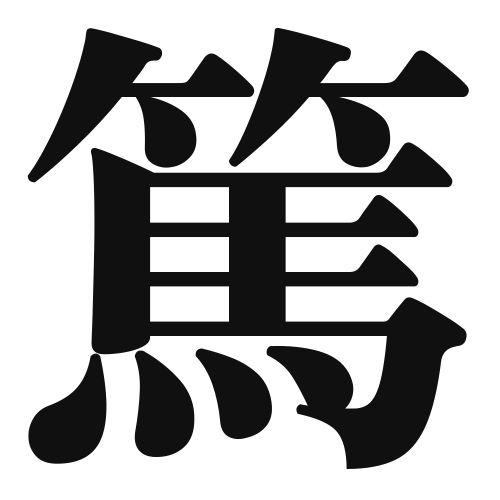1. Overview of Meaning
The kanji “篤” (pronounced “toku”) generally means “sincere,” “earnest,” or “kind-hearted.” It conveys a sense of deep commitment and genuine intention in actions and feelings.
2. Formation and Radical
Formation of the Kanji: The kanji “篤” is a compound character (会意文字) that combines elements to convey its meaning. It consists of the radical “竹” (bamboo) and the character “徳” (virtue), suggesting a strong moral foundation.
Radical: The radical of “篤” is “竹,” which relates to bamboo, often symbolizing flexibility and strength in Japanese culture.
3. Examples of Usage
Common Words and Phrases: Some frequently used words that include “篤” are “篤志” (toku-shi, meaning “sincere aspiration”) and “篤実” (toku-jitsu, meaning “sincerity”).
Example Sentences in Daily Conversation:
- 彼は篤い心を持っている。 (Kare wa tokui kokoro o motte iru.) – He has a sincere heart.
- 篤志を持って、ボランティア活動に参加しました。 (Toku-shi o motte, borantia katsudō ni sanka shimashita.) – I participated in volunteer activities with sincere aspirations.
4. Synonyms and Antonyms
Similar Kanji: A similar kanji is “誠” (sei), which also means “sincerity” but emphasizes truthfulness and honesty. While “篤” focuses on earnestness and kindness, “誠” highlights the aspect of truth.
Antonyms: An antonym of “篤” is “偽” (gi), meaning “false” or “deceptive,” which represents insincerity and dishonesty.
5. Cultural and Historical Background
Relation to Japanese Culture: The concept of sincerity is highly valued in Japanese culture, often associated with trust and respect in relationships. The kanji “篤” reflects this cultural importance.
Proverbs and Idioms: One relevant proverb is “篤志の人は必ず成功する” (Toku-shi no hito wa kanarazu seikō suru), which means “A person with sincere aspirations will surely succeed.” This highlights the belief in the power of earnestness in achieving goals.
